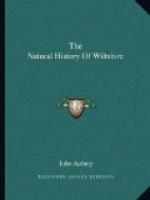Now, although Mindip-hills and Whitesheet, &c., are
as a barr and skreen to keep off from Wiltshire the
westerly winds and raines, as they doe in some measure
repel those noxious vapours, yet wee have a flavour
of them; and when autumnal agues raigne, they are more
common on the hills than in the vales of this country.
___________________________________
The downes of Wiltshire are covered with mists, when the vales are clear from them, and the sky serene; and they are much more often here than in the lowest story or stage.
The leather covers of bookes, &c. doe mold more and sooner in the hill countrey than in the vale. The covers of my bookes in my closet at Chalke would be all over covered with a hoare mouldinesse, that I could not know of what colour the leather was; when my bookes in my closet at Easton- Piers (in the vale) were not toucht at all with any mouldiness.
So the roomes at Winterslow, which is seated exceeding high, are very mouldie and dampish. Mr. Lancelot Moorehouse, Rector of Pertwood, who was a very learned man, say’d that mists were very frequent there: it stands very high, neer Hindon, which one would thinke to stand very healthy: there is no river nor marsh neer it, yet they doe not live long there.
The wheat hereabout, sc. towards the edge of the downes, is much subject to be smutty, which they endeavour to prevent by drawing a cart-rope over the corne after the meldews fall.
Besides that the hill countrey is elevated so high
in the air, the soile doth consist of chalke and mawme,
which abounds with nitre, which craddles the air,
and turns it into mists and water.
___________________________________
On the east side of the south downe of the farme of Broad Chalke are pitts called the Mearn-Pitts*, which, though on a high hill, whereon is a sea marke towards the Isle of Wight, yet they have alwaies water in them. How they came to be made no man knowes; perhaps the mortar was digged there for the building of the church.
* Marne is an old French word for marle. ___________________________________
Having spoken of mists it brings to my remembrance that in December, 1653, being at night in the court at Sr. Charles Snell’s at Kington St. Michael in this country, there being a very thick mist, we sawe our shadowes on the fogg as on a wall by the light of the lanternes, sc. about 30 or 40 foot distance or more. There were several gentlemen which sawe this; particularly Mr. Stafford Tyndale. I have been enformed since by some that goe a bird-batting in winter nights that the like hath been seen: but rarely.
[A similar appearance to that here mentioned by Aubrey
is often witnessed in mountainous countries, and in
Germany has given rise to many supernatural and romantic
legends. The “spectre of the Brocken”,
occasionally seen among the Harz mountains in Hanover,
is described by Mr. Brayley in his account of Cumberland,
in the Beauties of England and Wales, to illustrate
some analogous appearances, which greatly astonished
the residents near Souterfell, in that county, about
a century ago.- J. B.]
___________________________________




